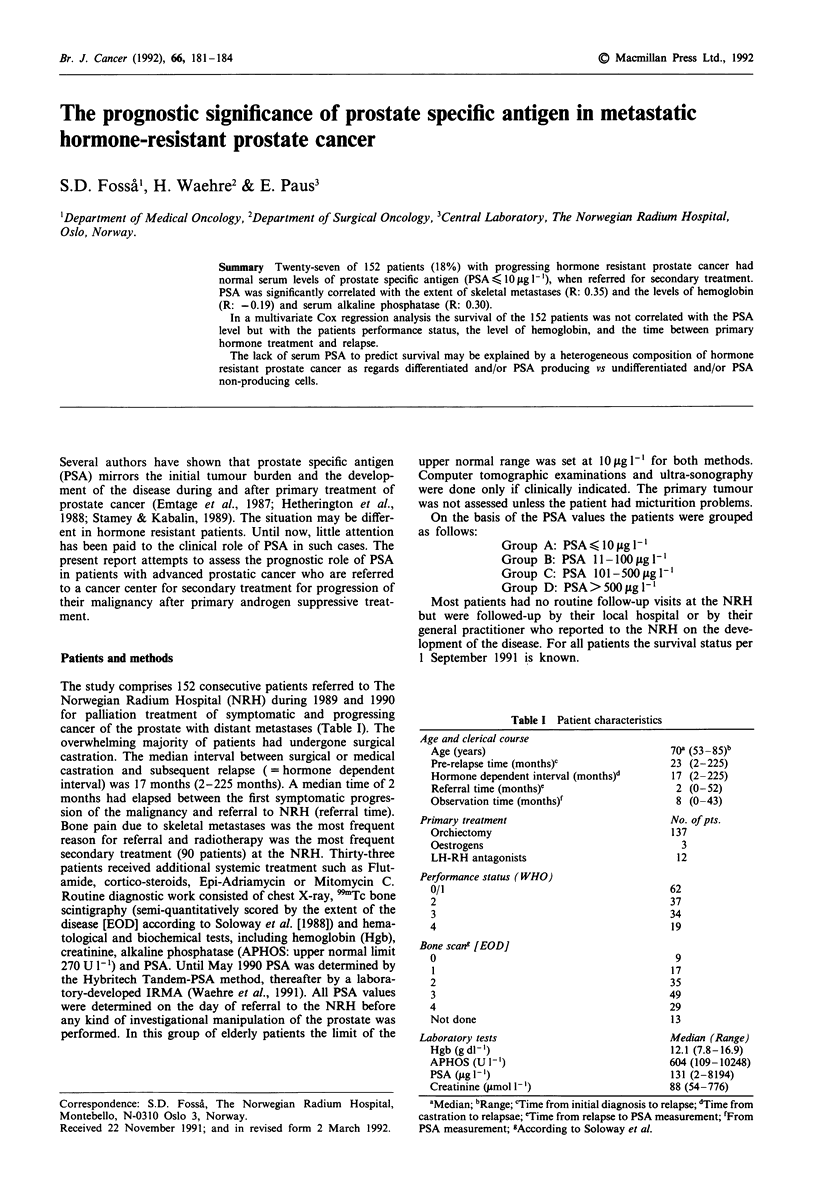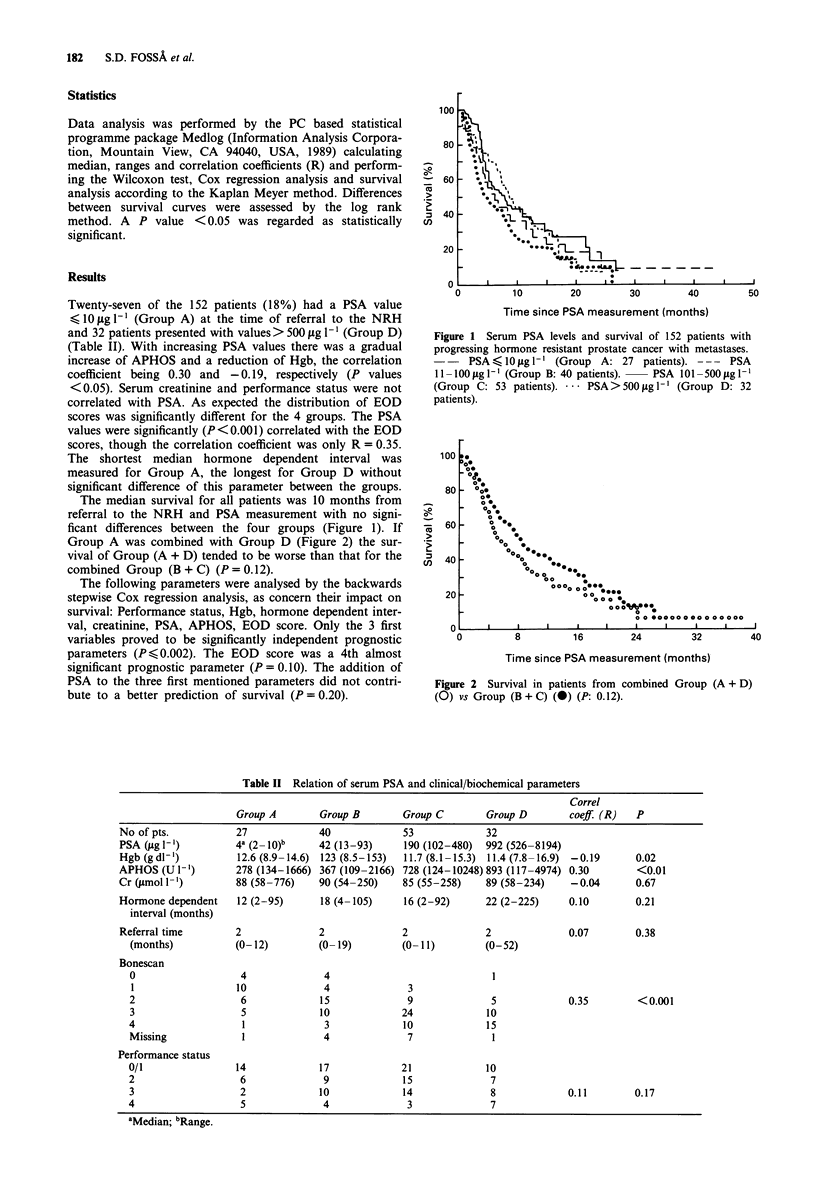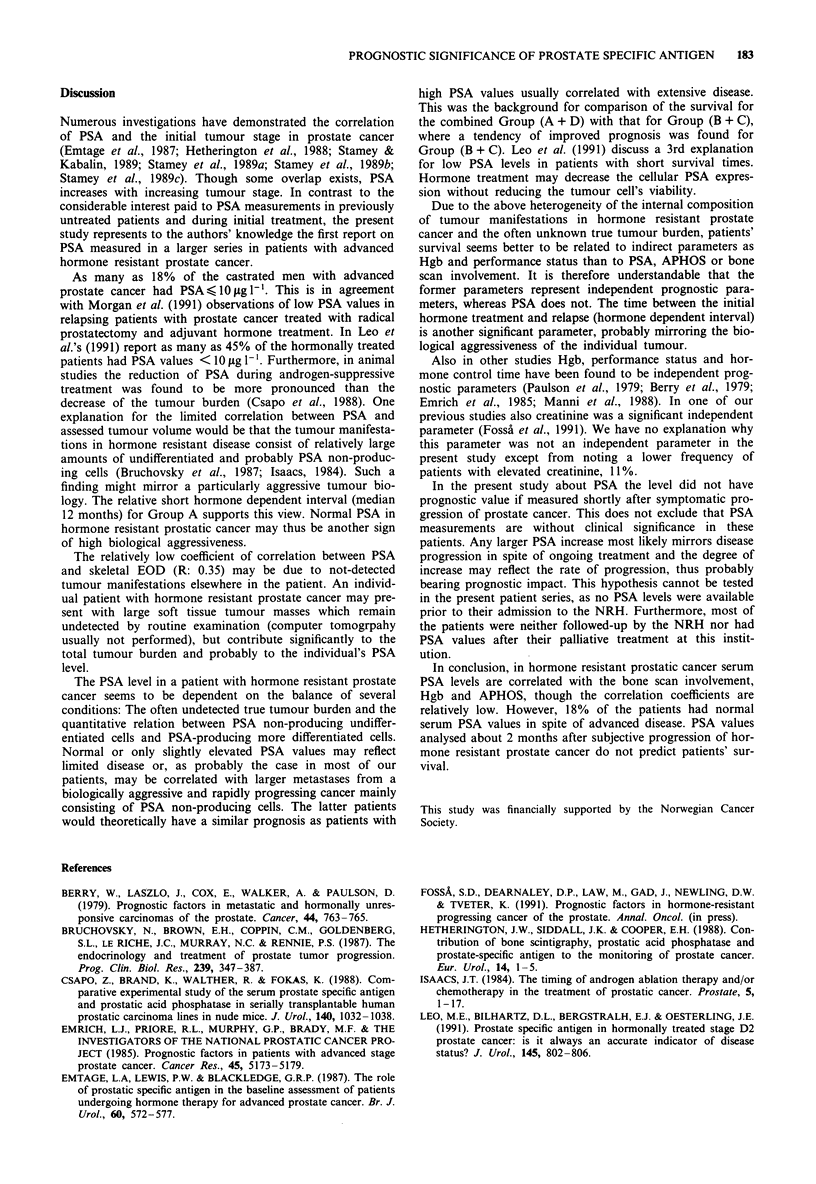Abstract
Twenty-seven of 152 patients (18%) with progressing hormone resistant prostate cancer had normal serum levels of prostate specific antigen (PSA less than or equal to 10 micrograms l-1), when referred for secondary treatment. PSA was significantly correlated with the extent of skeletal metastases (R: 0.35) and the levels of hemoglobin (R: -0.19) and serum alkaline phosphatase (R: 0.30). In a multivariate Cox regression analysis the survival of the 152 patients was not correlated with the PSA level but with the patients performance status, the level of hemoglobin, and the time between primary hormone treatment and relapse. The lack of serum PSA to predict survival may be explained by a heterogenous composition of hormone resistant prostate cancer as regards differentiated and/or PSA producing vs undifferentiated and/or PSA non-producing cells.
Full text
PDF



Selected References
These references are in PubMed. This may not be the complete list of references from this article.
- Berry W. R., Laszlo J., Cox E., Walker A., Paulson D. Prognostic factors in metastatic and hormonally unresponsive carcinoma of the prostate. Cancer. 1979 Aug;44(2):763–775. doi: 10.1002/1097-0142(197908)44:2<763::aid-cncr2820440251>3.0.co;2-5. [DOI] [PubMed] [Google Scholar]
- Bruchovsky N., Brown E. M., Coppin C. M., Goldenberg S. L., Le Riche J. C., Murray N. C., Rennie P. S. The endocrinology and treatment of prostate tumor progression. Prog Clin Biol Res. 1987;239:347–387. [PubMed] [Google Scholar]
- Csapo Z., Brand K., Walther R., Fokas K. Comparative experimental study of the serum prostate specific antigen and prostatic acid phosphatase in serially transplantable human prostatic carcinoma lines in nude mice. J Urol. 1988 Nov;140(5):1032–1038. doi: 10.1016/s0022-5347(17)41921-5. [DOI] [PubMed] [Google Scholar]
- Emtage L. A., Lewis P. W., Blackledge G. R. The role of prostate specific antigen in the baseline assessment of patients undergoing hormone therapy for advanced prostate cancer. Br J Urol. 1987 Dec;60(6):572–577. doi: 10.1111/j.1464-410x.1987.tb05044.x. [DOI] [PubMed] [Google Scholar]
- Hetherington J. W., Siddall J. K., Cooper E. H. Contribution of bone scintigraphy, prostatic acid phosphatase and prostate-specific antigen to the monitoring of prostatic cancer. Eur Urol. 1988;14(1):1–5. doi: 10.1159/000472885. [DOI] [PubMed] [Google Scholar]
- Isaacs J. T. The timing of androgen ablation therapy and/or chemotherapy in the treatment of prostatic cancer. Prostate. 1984;5(1):1–17. doi: 10.1002/pros.2990050102. [DOI] [PubMed] [Google Scholar]
- Leo M. E., Bilhartz D. L., Bergstralh E. J., Oesterling J. E. Prostate specific antigen in hormonally treated stage D2 prostate cancer: is it always an accurate indicator of disease status? J Urol. 1991 Apr;145(4):802–806. doi: 10.1016/s0022-5347(17)38456-2. [DOI] [PubMed] [Google Scholar]
- Manni A., Bartholomew M., Caplan R., Boucher A., Santen R., Lipton A., Harvey H., Simmonds M., White-Hershey D., Gordon R. Androgen priming and chemotherapy in advanced prostate cancer: evaluation of determinants of clinical outcome. J Clin Oncol. 1988 Sep;6(9):1456–1466. doi: 10.1200/JCO.1988.6.9.1456. [DOI] [PubMed] [Google Scholar]
- Morgan W. R., Zincke H., Rainwater L. M., Myers R. P., Klee G. G. Prostate specific antigen values after radical retropubic prostatectomy for adenocarcinoma of the prostate: impact of adjuvant treatment (hormonal and radiation) J Urol. 1991 Feb;145(2):319–323. doi: 10.1016/s0022-5347(17)38327-1. [DOI] [PubMed] [Google Scholar]
- Paulson D. F., Berry W. R., Cox E. B., Walker A., Laszlo J. Treatment of metastatic endocrine-unresponsive carcinoma of the prostate gland with multiagent chemotherapy: indicators of response to therapy. J Natl Cancer Inst. 1979 Sep;63(3):615–622. doi: 10.1093/jnci/63.3.615. [DOI] [PubMed] [Google Scholar]
- Soloway M. S., Hardeman S. W., Hickey D., Raymond J., Todd B., Soloway S., Moinuddin M. Stratification of patients with metastatic prostate cancer based on extent of disease on initial bone scan. Cancer. 1988 Jan 1;61(1):195–202. doi: 10.1002/1097-0142(19880101)61:1<195::aid-cncr2820610133>3.0.co;2-y. [DOI] [PubMed] [Google Scholar]
- Stamey T. A., Kabalin J. N., Ferrari M. Prostate specific antigen in the diagnosis and treatment of adenocarcinoma of the prostate. III. Radiation treated patients. J Urol. 1989 May;141(5):1084–1087. doi: 10.1016/s0022-5347(17)41176-1. [DOI] [PubMed] [Google Scholar]
- Stamey T. A., Kabalin J. N., Ferrari M., Yang N. Prostate specific antigen in the diagnosis and treatment of adenocarcinoma of the prostate. IV. Anti-androgen treated patients. J Urol. 1989 May;141(5):1088–1090. doi: 10.1016/s0022-5347(17)41177-3. [DOI] [PubMed] [Google Scholar]
- Stamey T. A., Kabalin J. N., McNeal J. E., Johnstone I. M., Freiha F., Redwine E. A., Yang N. Prostate specific antigen in the diagnosis and treatment of adenocarcinoma of the prostate. II. Radical prostatectomy treated patients. J Urol. 1989 May;141(5):1076–1083. doi: 10.1016/s0022-5347(17)41175-x. [DOI] [PubMed] [Google Scholar]
- Stamey T. A., Kabalin J. N. Prostate specific antigen in the diagnosis and treatment of adenocarcinoma of the prostate. I. Untreated patients. J Urol. 1989 May;141(5):1070–1075. doi: 10.1016/s0022-5347(17)41174-8. [DOI] [PubMed] [Google Scholar]


